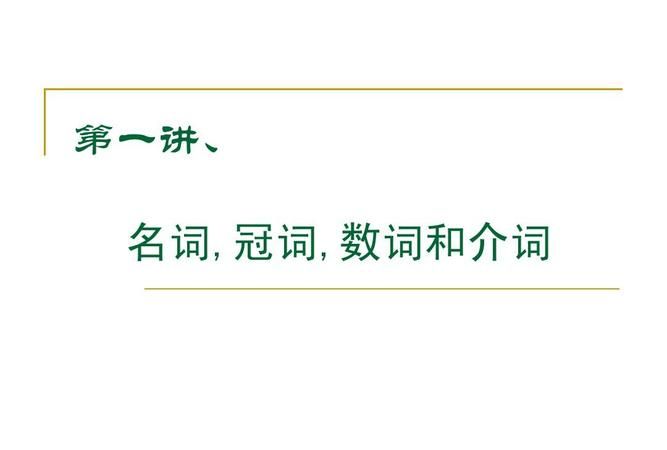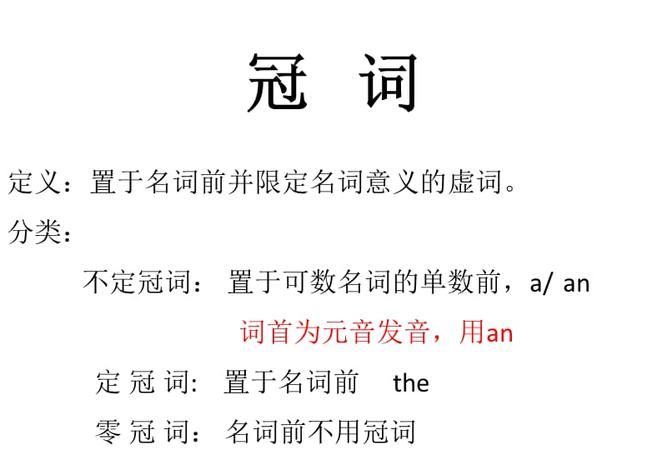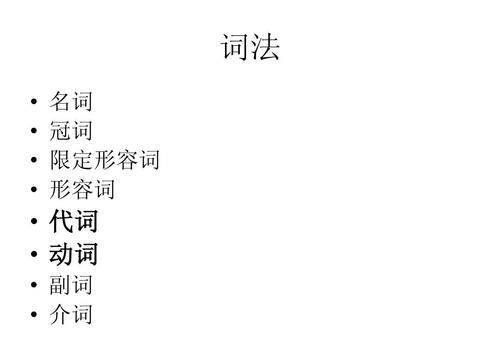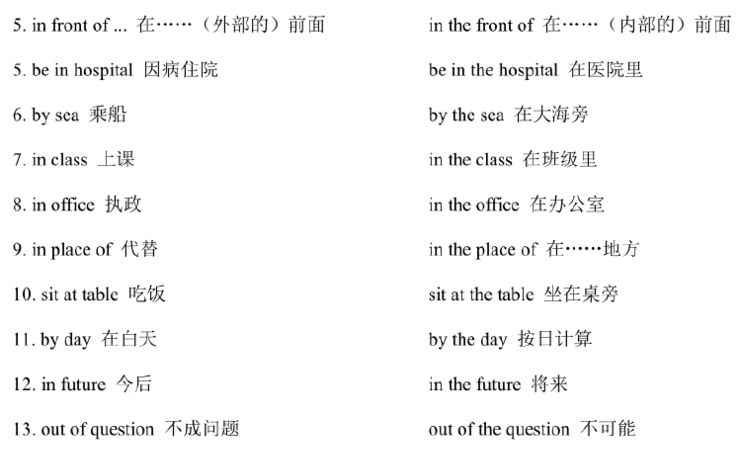本文目录
定冠词和不定冠词的区别
冠词的定义
冠词是置于名词之前,对名词起限制作用的一种虚词。
冠词可以说是名词的一种标志,它不能离开名词而独立存在。
冠词的分类
冠词分为不定冠词"a,an"、定冠词"the"和零冠词三种,零冠词指的是不用冠词
的情况。
不定冠词(a/an)表示泛指,定冠词(the)表示特指。
不定冠词的用法-1
不定冠词有"a和an"两种形式。"a"用在以辅音开头的词前,"an"用在以元音
开头的词前。判断一个词是以元音开头还是以辅音开头,是根据读音而不是
根据字母。
1. 用于可数名词的单数形式前,表示"一"
There is a tiger in the zoo.
动物园里有一只老虎。
2. 表示一类人和东西
A tiger can be dangerous.
老虎可能有危害性。
3. 表示"某一个"的意思
A gentleman wants to see you.
有一位先生要见你。
4. 表示"同一"的意思
They are nearly of an age.
他们几乎同岁。
The two shirts are much of a size.
这两件衬衫大小差不多。
5. 表示"每一"的意思
We go swimming four times a week.
我们每周去游泳四次。
6. 用在作表语的单数可数名词前,表示身份、职业
My mother is a teacher.
我妈妈是教师。
7. 第一次提到的人或事物,但不特别指明是哪一个
Long long ago there was an old king who had a very beautiful daughter.
很久很久以前,有一个年老的国王,他有一个非常美丽的女儿。
8. 在英国英语中,以"h"开头的多音节词,如第一个音节不重读,其前亦可用"an"
There is an hotel near here.
这附近有一家旅馆。
9. 在such a,quite a句式中
He is quite a good actor.
他是一个相当好的演员。
Don't be in such a hurry.
不要如此匆忙。
10. 在感叹句 what...的句式中
What a pretty girl she is!
她是一个多么漂亮的女孩呀!
不定冠词的用法-2
用在某些表示数量的词组中:
a lot of 许多
a couple of 一对
a great many 很多
a dozen 一打(但也可以用 one dozen)
a great deal of 大量
定冠词的用法-1
1. 用以特指某(些)人或某(些)事物
This is the house where Luxun once lived.
这是鲁迅曾经住过的房子。
2. 用于指谈话双方都明确所指的人或事物
Open the door, please.
请把门打开。
3. 用以复述上文提过的人或事物(第一次提到用“a或an”,以后再次提到用“the”)
Once there lived a lion in the forest. Every day the lion asked small animals to
look for food for him.
从前森林里住着一只狮子。每天这只狮子要小动物们为他寻找食物。
4. 用在序数词和形容词最高级前
January is the first month of the year.
一月份是一年当中的第一个月。
Shanghai is the biggest city in China.
上海是中国最大的城市。
5. 表示世界上宇宙中独一无二的事物
the sun 太阳 the moon 月亮
the earth 地球 the sky 天空
the world 世界
6. 指由普通名词构成的专有名词
the West Lake 西湖 the Great Wall 长城
the United States 美国 the United Nations 联合国
定冠词的用法-2
7. 表示方向、方位
in the east 在东方 in the west 在西方
in the front 在前面 at the back 在后面
in the bottom 在底部 at the top 在顶部
on the right 在右边 on the left 在左边
8. 在海洋、江河、湖泊、山脉、海峡、海湾等地理名词前
the Pacific Ocean 太平洋 the Huanghe River 黄河
the Tainshan Mountains 天山山脉 the Taiwan Straits 台湾海峡
9. 在姓氏复数前,表示一家人
The Bakers came to see me yesterday.
贝克一家人昨天来看我。
10. 和某些形容词连用,使形容词名词化,代表一类人或物
the poor 穷人 the rich 富人
the sick 病人 the wounded 伤员
the good 好人 the beautiful 美丽的事物
11. 用在表示阶级、政党的名词前
the working class 工人阶级
the Chinese Communist Party 中国共产党
12. 用在the very强调句中
This is the very book I want.
这就是我想要的那本书。
13. 在the more, the more比较级的句式中
The more you drink, the more you like it.
你越喝就越爱喝。
14. 表示演奏乐器时,乐器的前面要加the
play the piano 弹钢琴
play the violin 拉小提琴
15. 某些固定的表达法
in the morning 在早上 in the afternoon 在下午
in the evening 在晚上 go to the cinema 去看电影
go to the theatre 去看戏 all the year round 一年到头
on the way to 前往...去的路上
16. the加单数可数名词可以表示一类人或事物
The horse is a useful animal.
马是一种有用的动物。
注意:像这类句子还有如下两种写法
A horse is a useful animal.
Horses are useful animals.
零冠词的用法
1. 专有名词前一般不加冠词
China 中国 Europe 欧洲
Lei Feng 雷锋 William Shakespeare 威廉·莎士比亚
2. 月份、周日、节日前一般不加冠词
January 一月份 Sunday 星期日
Christmas Day 圣诞节 Thanksgiving 感恩节
National Day 国庆节 May Day 劳动节
比较: ...on a Sunday morning.
在一个星期天的早晨... (表示某一个。)
3. 三餐、四季前一般不加冠词
I have lunch at school.
我在学校吃午餐。
Summer is the best season for swimming.
夏天是游泳的好季节。
比较: I had a big lunch yesterday.
昨天我吃了一顿丰盛的午餐。(表示某一个)
The dinner given by Mr Smith was very nice.
史密斯先生款待的晚宴真是美味。(表示特指)
比较: I will never forget the summer we spent in Hawaii.
我永远不会忘记我们一起在夏威夷度过的那个夏天。
(表示特指)
4. 进行球类运动
play basketball 打篮球 play volleyball 打排球
play football 踢足球
5. 没有特指的物质名词
This cart is made of wood.
这辆手推车是用木头作的。
比较: The wood outside was all wet.
外面的那些木头都湿了。(表示特指)
6. 没有特指的不可数抽象名词
Time is precious.
时间是宝贵的。
比较: The time of the play was 1990s.
这个剧本的时代背景是二十世纪九十年代。(表示特指)
7. 没有特指的可数名词复数形式后。
I like tomatoes.
我喜欢西红柿。
8. 山峰
Mount Qomolangma 珠穆朗玛峰
9. 固定词组
go to school 去上学 go to bed 上床睡觉
go by train 乘火车去 go by boat 乘船去
at table 在用餐 in hospital 住院
at school 求学 in school 求学
at noon 在中午 at night 在晚上
at midnight 在半夜 in town 在城里
10. 独立结构中的名词不加冠词
A boy came in, book in hand.
一个男孩进来,手上拿着书。
11. 泛指人类
Man is mortal.
人必有一死。
12. 在"kind of+名词 sort of+名词"句式中
What kind of flower is it?
这是什么花?
I like this sort of book.
我喜欢这种书。
13. 指职位、头衔的词,如king,captain,president,chairman 等。
He is (the) captain of the team.
他是球队的队长。
As (the) chairman of the committee, I declare the meeting open.
作为委员会主席,我宣布会议开始。
冠词和三餐的搭配
三餐名词单独使用时,之前通常不加冠词
三餐名词之前若加形容词时则除外:
We have breakfast at eight.
我们8点钟吃早饭。
He gave us a good breakfast.
他请我们吃了一顿丰盛的早餐。
I was invited to dinner.
他们邀请我吃饭。
I was invited to a dinner given to welcome the new ambassador.
我被邀请参加欢迎新任大使的宴会。
The Scots have porridge for breakfast.
苏格兰人早餐吃粥。
The wedding breakfast was held in her father’s house.
婚礼早宴是在她父亲家举行的。
介词短语与冠词
一.
at table 在进餐
at the table 在桌子旁边
at desk 在读书
at the desk 在课桌旁
at school 在上学
at the school 在学校里
in class 在上课
in the class 在班级里面
in bed 卧床
in the bed 在床上
in prison 坐牢
in the prison (因事)在监狱
in hospital 住院
in the hospital (因事)在医院
go to school 去上学
go to the school (因事)去学校
go to bed 上床睡觉
go to the bed 在床上
go to hospital 去看病
go to the hospital 去医院
二.
take place 发生
take the place 代替
in place of 代替
in the place of 在...的地方
in case of 万一
in the case of 就...来说
out of question 毫无疑问
out of the question 完全不可能
通常使用不定冠词的短语
after a while 过了一会儿
all of a sudden 突然
as a rule 通常
as a result 结果,因此
as a matter of fact 事实上
as a whole 大体上
at a loss 不知所措
in a hurry 急忙
in a way 在某种程度上
in a word 总而言之
It’s a pity that… 令人遗憾的是…
put an end to… 结束…
come to an end 结束
come to a conclusion 得出结论
have a good time 玩得愉快
have a rest 休息一下
have a cold 感冒
have a word with 和…谈一谈
keep an eye for 对…有鉴赏力
make a living 谋生
make a fire 生火
make a fool of 愚弄
take a walk 散步

定冠词和不定冠词的区别
通常以下情况用the
a)单一的事物,也就是只有一样、一件或一套
例:the world, the sky, the atmosphere, the sun, the ground, the climate, the horizon, the human race, the environment, the travel industry, the Internet
b)宽广的地理区域
例:the beach, the town, the sea(side), the land, the country(side)
c)时间范围
例:the past, the present, the future
需注意以上部分涉及到广义的名词前可以什么都不加,例如
Climate is one of the many factors involved in changing farming methods. (或The climate...)
These flowers grow best in sandy soil and sun.
In autumn the temperature difference between land and sea decreases. (或...the land and the sea...)
以上名词如果是特指或特例,可以用a/an。例如:
I could see the plane high up in the sky.(天空就是一个天空,非特指,用the sky)
When I woke up there was a bright blue sky. (特指我醒来时的天空,用a sky)
What are your plans for the future? (泛指未来这个时间概念,用the future)
She dreamt of a future where she could spend more time painting. (特指她脑海中想象的未来,用a future)
谈论某一类事物的共性时,用the+可数名词单数形式,例:
The computer has revolutionised publishing. (这里说的是电脑这种物件整体带来的效应,而非谈论个体,所以不能用a computer)
The computer is an important research tool. (理由同上)
A computer is an important research tool. (这句话既可以用来指所有的电脑,也可以特指某台电脑,所以可以用a computer)
谈论一类物品时,可以用可数名词复数替代the+可数名词单数,例:
Computers are an important research tool.
谈论一个或一组特定物品时,可以用the+可数名词复数或不可数名词,例:
The computers have arrived. Where shall I put them?
The music was wonderful. I could have listened to the orchestra all night.
当定义某物或强调一群人或物中的特定种类时,通常用a/an而不是the,例:
A corkscrew is a gadget for getting corks out of bottles.
A garden is there to give you pleasure, not to be a constant worry.
有些名词既可以作不可数也可以作可数,作为整体或观念时为不可数,作为一个或几个个体示例时为可数。当这些名词是可数名词时,可以用a/an或复数形式。例如:
I don't drink coffee. (咖啡泛指时是不可数名词)
Would you like a coffee? (特指a cup of coffee)
He shook with fear. (恐惧泛指是不可数名词)
He has a fear of heights. (针对特定情况的恐惧用a)
此类名词还有conversation, grammar, importance, iron, pleasure, shampoo, sound. 其中有些名词像grammar, iron作可数和不可数时意义不同。
讨论某人的工作或职业时用a/an,例:
She was a company director when she retired.
Against her parents' wishes, she wants to be a journalist.
然而谈论某人的职位,且该职位通常只有1个人担任时,用the或不加冠词,例:
She's been appointed (the) head of the company.
I'm a production manager at Fino. (可能这家公司有好几个生产经理,所以用a)
the position of, the post of, the role of+职位时,不加任何冠词,例如:
Dr Simons has taken on the position of Head of Department.
通常人名或地名前不加冠词,但是以下情况除外
a)为了区分重名的人,例:
That's not the Stephen Fraser I went to school with.
There was a Stephen Fraser in my class. (班里有个人名叫Stephen)
b)强调该人为名人时用the,例如
Do they mean the Neil Armstrong, or someone else?
c)人名前有形容词或职业名词,例如
the late Michael Jackson, (the) artist Joseph Turner
d)提到一家人时用the,例如
The Robinsons are away this weekend.
如果某人很优秀,提到该人的人名时加a/an或不加冠词,例如:
Majid plays tennis well, but he'll never be (a) Roger Federer.
提到某特定生产厂商制造的单件产品或某特定艺术家的作品加a/an,例如
I've jsut bought a Mercedes.
Do you think it could be a Van Gogh/a Rembrandt?
提到不认识的人可以在人名前加a/an,例如:
Dr Lee is here for you. (听话人认识Dr Lee)
There's a Dr Amy Lee on the phone. (不认识)Do you want to talk to her?
讲故事或笑话时,通常用this而不是a/an来带出一个新人物/事物。this可以强调即将成为话题点的人或物,例如:
As I was walking along, this spider(=a spider) landed on my head, and...
This man (=a man) goes into a chemist and he says...
名词或定义短语前的形容词最高级前加the,例如
He is the finest young player around at the moment.
但是口语中,如果形容词最高级后没有带名词或定义短语,则the可以省略,例如:
A:Why did you decide to stay in this hotel?
B:It was (the) cheapest. 比较 It was the cheapest I could find.(cheapest后面带定义短语,不能省略前面的the)
复数或不可数名次泛指时前面不加冠词,但假设听话人或读者知道谈到的人或物,或有单词能明确所说的人或物时,前面加the,例如:
The government has promised not to tax books. (书是泛指)
The books have arrived. (特指定的书)
Music played an important part in his life. (泛指音乐)
I thought the music used in the film was the best part. (特指电影中的音乐)
泛指节假日、一年中的特定时刻,月、一周中跟Easter, Ramadan, New Year's Day有关的日期前不加冠词,例如:
I'll see you on Saturday. (=下周六)
We met on Saturday. (=上周六)
They came on a Saturday as far as I can remember. (只需要知道他们是周六来,至于是哪个周六不重要)
They came on the Saturday after our party. (特指聚会后的那个周六)
泛指春夏秋冬和New Year(包括整个新年放假时间段)时,前面不加冠词或加the,例如
In (the) summer I try to spend as much time as I can in the garden.
特定的春夏秋冬前,加the,例如
I'd like to go skiing in the autumn. (=今年)
I first went skiing in the spring of 2002.
I'll see you again in the New Year. (即将到来的明年的新年)
描述一个特殊的节假日、季节或某个特殊时刻,并且将其与其他日子比较来衬托其特殊性时,可以用It/That was ... +a/an+名词+修饰语,例如:
That was a winter I'll never forget. (与其它冬天比有其特殊性)
That was the winter we went to Norway. (只是陈述一个特定冬季)
midnight, midday和noon前不加冠词,例如:
If possible, I'd like it finished by midday.
Midnight couldn't come quickly enough.
dawn前可以加或不加the,例如
He got back into bed and waited for (the) dawn.
听说双方都知道的某一天的早中晚前可加the,例如:
I enjoyed the morning, but in the afternoon the course was boring.
Morning is the time I work best. (泛指早晨不加冠词,此处用The morning...也可以)
I'll be there by (the) morning/evening. (但是只能...by the afternoon,不能...by afternoon)
I waited all morning. (比all the morning/afternoon更常用)
'You look upset.' 'Yes, I've had a terrible mroning.' (与其它早晨相比)
搭乘交通工具用by+交通工具,例如:
I generally go by bus to work. 也可以说成I generally take the bus to work.

英语短语中加the与不加the的区别
in the bed 睡着了,或者是躺在床上,特别是在床上呆了一阵子了。(因为英英字典的解释是:after a very lengthy period of time)
in bed尤指在行房过程中或者在床上做事的过程中。比如:He performs well in bed. 又如:Jack and Jane had breakfast in bed.
这个问题主要在于理解定冠词的意义
定冠词是表特指,生硬的翻译过来就是 "呆在那张床上"
那么从字面看,就看不出在床上做什么.
而没有定冠词,则表明在床上睡觉.
这和英语的表达习惯有关

定冠词和不定冠词有什么区别吗
定冠词和不定冠词
(1)当我们学习课文内容时,未必很注意冠词的用法。但冠词伴随名词,帮助表达名词的含义,确实随处可见。
冠词的使用有一定的规则,但亦有相当多的习惯用法或特殊用法。有时用不用冠词,意思差别很大,如in front of和in the front of:
An old woman walked slowly in front of the car.
一位老太太在小汽车前慢慢走着。(汽车外的前面)
He's sitting in the front of the car with the driver.
他和司机一起坐在小汽车的前座。(汽车内的前部)
因此,学习定冠词,我们一要学一些法则;二要熟记一些惯用短语;三要留心课文句子中出现的特殊情况。
学习定冠词方法一:记一些使用法则。
①定冠词是指特定的人或物,用于特指的名词前。如:Who's the man?The book is mine.
②当第二次提到某人或某物时,要用定冠词。如:There is a factory near No.14 Middle School.The factory has been there for several years.
③形容词最高级前用the:the heaviest truck,the most expensive jacket。
④序数词前用the:the third lap,the second turning.
⑤世界上只有一个这样的事物前用the:The moon goes round the earth,and the earth goes round the sun.
⑥方位词前用定冠词the:in the east,in the northwest,on the left,on the right.
⑦定冠词可和可数名词单数连用,代表一类人或东西。如:
The telephone was invented by Alexander G.Bell.
⑧在姓的复数前加the,表示一家人或夫妇。如:the Greens表示格林一家人或格林夫妇,等等。
学习定冠词方法二:熟记学到的惯用短语。如 at the same time,all the same,look the same (same前用定冠词),all the time,at the beginning of,at the end of,at the moment,by the way,on the way home,in the end,in the middle of,on the side of,during the holiday,by the end of the twentieth century,for the last time。
学习定冠词方法三:留心课文句子中出现的特殊情况。
例如:在中国的北方应译为in the north of China。但North China,用方位词修饰专有名词,就不用定冠词,译为“华北”,有确切的地理和行政范围,它和泛泛的“中国的北方”含义不同。
又如由普通名词构成的专有名词,前面须加定冠词,如山脉、 河流、一些名胜等:the Yellow River,the Rocky Mountains (落基山脉),the Great Wall,the Summer Palace (颐和园)等;而在Ayers Rock,和Jiangsu Province等之前就没有定冠词。
这种不加定冠词的情况已日渐多见,这没有什么语法可讲,需要我们留心和注意。
(2)不定冠词a和an的区别
a和an的区别在于:如不定冠词后的名词或者形容词,是以辅音读音开头(注意,不是以辅音字母开头,而是以辅音读音开头),则不定冠词用a。不定冠词之后的名词或者形容词,以元音读音开头(注意,不是以元音字母开头,而是以元音读音开头),则不定冠词用an。
1)例如u虽然是元音字母,但它的字母名称是。是辅音,当u在单词开头读时,前面的冠词要用a,如a useful language,a unit,a university等;但u在单词开头也可能读,那就是元音开头了,其前面的冠词就要用an,如an uncle,an unhappy family,an unusual day,an untrue story等。
2)又如在26个字母中,有一些辅音字母的字母名称是以元音开头的。如f ,1 ,m ,n ,s ,x ,h ,r ,这时我们应该这样说:There is a“u”and an “s”in the word“US”.
3) 要注意h开头的单词有不发音的情况,例如an hour,an honest man。但h如读 ,那就是辅音了例如a hen,a hat,a hole,a horse。 a和an虽然有上述用法上的区别,但它实质上是一个词,意义是一样的。
①都有数量的含义,表示one。例如:
I need a dictionary.我需要一本字典。
He has an egg and a cake for breakfast.早餐他吃了一个鸡蛋和一块蛋糕。
② a和an所以叫不定冠词,或称类指,它通常是anyone的意思,即同类中的任何一个,one member of a class (类),而非特指的一个。例如:
A child needs love.(任何一个)孩子需要爱。
A horse is a useful animal.马是有用的动物。
③ a和an还含有every,each或per (每)的含义。如once a week每周一次;100 kilometres an hour每小时100千米;five dollars a kilo每千克5美元。
最后,在学习和掌握不定冠词a和an的用法时,我们强调要熟记含有不定冠词的词组或惯用短语,如half an hour,in a minute,in a hurry,just a moment,What a pity! With a smile,It's a pleasure,quite a nice shop,have a cold,have a look at,have a rest,have a match,have a try,have a good time,have a meeting,go for a walk,catch a bus,want a go,make a telephone call,leave a message等等。熟记一些常用词组,是一个重要的有效的学习方法

以上就是关于一个词组加冠词和不加的区别 ,定冠词和不定冠词的区别的全部内容,以及一个词组加冠词和不加的区别 的相关内容,希望能够帮到您。

